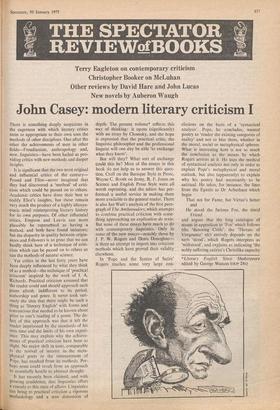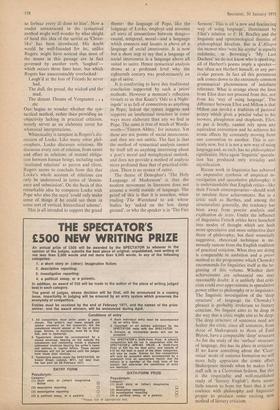REVIEWofBOOKS
Terry Eagleton on contemporary criticism Christopher Booker on McLuhan Other reviews by David Hare and John Lucas New novels by Auberon Waugh
John Casey: modern literary criticism I There is something deeply suspicious in the eagerness with which literary critics seem to appropriate to their own uses the methods of other disciplines. One after the other the achievements of men in other fields—Freudianism, anthropology and, now, linguistics—have been hailed as pro- viding critics with new methods and deeper insights.
It is significant that the two most original and influential critics of the century— Pound and Eliot—never imagined that they had discovered a 'method' of criti- cism which could be passed on to others. Academic critics have done their best to codify Eliot's insights, but these remain very much the product of a highly idiosyn- cratic mind reinterpreting literary history for its own purposes. Of other influential critics, Empson and Leavis can more plausibly be represented as having a method, and both have found imitators; but the disparity in quality between origin- ators and followers is so great that we can hardly think here of a technique of criti- cism which can be passed on to others as can the methods of natural science.
Yet critics in the last forty years have been deeply influenced by what they think of as a method—the technique of `practical criticism' inspired by the work of I. A. Richards. Practical criticism assumed that the reader could and should approach each Poem afresh, indifferent to its period, authorship and genre. It never took seri- ously the idea that there might be such a thing as `literary English' with forms and conventions that needed to be known about Prior to one's reading of a poem. The de- fect of this approach was that it left the reader imprisoned by the standards of his OW n time and the limits of his own experi- ence. This may explain why the achieve- ments of practical criticism have been so Slight, No major shift in taste, comparable to the revival of interest in, the meta- physical poets or the reinstatement of Pope, has resulted from its methods. Per- haps none could result from an approach SO essentially hostile to abstract thought.
It has recently been claimed, and with growing confidence, that linguistics offerS a remedy to this state of affairs. Linguistics can bring to practical criticism a rigorous methodology and a new dimension of depth. The present volume* reflects this way of thinking: it opens (significantly) with an essay by Chomsky, and the hope is expressed that the practical critic, the linguistic philosopher and the professional linguist will one day be able `to exchange what they know'.
But will they? What sort of exchange could this be? Most of the essays in this book do not help us to answer this ques- tion. Croll on the Baroque Style in Prose, Wayne C. Booth on Irony, R. F. Jones on Science and English Prose Style were all worth reprinting, and the editor has per- formed a useful service in making them more available to the general reader. There is also Ian Watt's analysis of the first para- graph of The Ambassadors, which attempts to combine practical criticism with some- thing approaching an explication de texte. But none of these essays have much to do with contemporary linguistics. Only in some of the new essays—notably those by J. P. W. Rogers and Denis Donoghue— is there an attempt to import into criticism methods which have proved their validity elsewhere.
In `Pope and the Syntax of Satire' Rogers reaches some very large con- elusions on the basis of a `syntactical analysis'. Pope, he concludes, wanted poetry to `render the existing categories of reality' and not to blur them, whether in the moral, social or metaphysical spheres. What is interesting here is not so much the conclusion as the means by which Rogers arrives at it. He uses the method of syntactical analysis not only in order to explain Pope's metaphysical and moral outlook, but also (apparently) to explain why his poetry had necessarily to be satirical. He takes, for instance, the lines from the Epistle to Dr Arbuthnot which begin That not for Fame, but Virtue's better end He stood the furious Foe, the timid Friend and argues that the long catalogue of nouns in apposition to 'Foe' which follows (the 'damning Critic', the 'Threats of Vengeance' etc) entirely depends on the verb 'stood', which Rogers interprets as 'withstood', and explains as indicating 'the nobly suffering satirist's Christlike capacity *Literary English Since Shakespeare edited by George Watson (ouP 24s) to forbear every ill done to him'. Now a reader uninstructed in the syntactical method might well wonder by what sleight of hand this idea of the satirist as 'Christ- like' has been introduced. His doubt would be well-founded for he, unlike Rogers, might have noticed that most of the nouns in this passage are in fact governed by another verb, 'laughed'— which occurs three lines later, but which Rogers has unaccountably overlooked : Laugh'd at the loss of Friends he never had, The dull, the proud, the wicked and the mad, The distant Threats of Vengeance . v etc One begins to wonder whether the syn- tactical method, rather than providing an objectivity lacking in practical criticism, merely serves as an elaborate cover for whimsical interpretations.
Whimsicality is rampant in Rogerss dis- cussion of Locke. Like many other phil- osophers, Locke discusses relations. He discusses every sort of relation, from cause and effect to relations of mutual obliga- tion between human beings, including such 'instituted relations' as patron and client, Rogers seems to conclude from this that Locke's whole account of relations can only be understood in terms of 'domin- ance and submission'. On the basis of this remarkable idea he compares Locke with Pope who also (he says) 'could only make sense of things if he could see them in some sort of vertical, hierarchical scheme'.
This is all intended to support the grand theme: the language of Pope, like the language of Locke, employs and assumes all sorts of connections between things— causal, temporal, moral—and a language which connects and locates is above all a language of social intercourse. It is now but a short step to say that a language of social intercourse is a language above all suited to satire. Hence syntactical analysis shows at a profound level why the eighteenth century was predominantly an age of satire.
It is comforting to have this traditional conclusion supported by such a priori methods. However a moment's reflection reveals to us that Keats's 'Ode to a Night- ingale' is as full of connectives as anything in Pope; indeed the syntax suggests and supports an intellectual structure in some ways more elaborate than any we find in Pope. The same is true of much of Words- worth—`Tintern Abbey,' for instance. Yet these are not poems of social intercourse. and they are not satiric. The fact is that the method of syntactical analysis cannot by itself tell us anything interesting about a poet's moral and metaphysical outlook, and does not provide a method of analysis more profound than that of practical criti- cism. There is no syntax of satire.
The theme of Donoghue's 'The Holy Language of Modernism' is that the modern movement in literature does not assume a world outside of language. The proof of this is that it is senseless, when reading The Wasteland to ask whose bodies lay 'naked on the low, damp ground', or who the speaker is in 'The Fire Sermon'. This is all 'a new and fascinating way of using language', illuminated by Eliot's relation to F. H. Bradley and the linguistic and epistemological theories of philosophical Idealism. But in L'Allegro the mower who 'wets his scythe' is equally indefinite; in Browning's 'My Last Duchess' we do not know who is speaking; all of Herbert's poems imply a speaker— but often not Herbert himself, or any par- ticular person. In fact all this portentous talk comes down to the extremely common grammatical phenomenon of indefinite• reference. What is strange about the lines from Eliot does not proceed from this, nor from his 'way of using language'. The difference between Eliot and Milton is that Milton can invoke a tradition of pastoral poetry which gives a precise value to his mowers, ploughmen and shepherds. Eliot, to put it briefly, cannot rely upon any equivalent convention and he achieves his ironic effects by constantly moving from one convention to another. This is cer- tainly new, but it is not a new way of using language.and, as such, has no philosophical significance. Here again 'linguistic' specula- tion has produced only triviality and mystification.
Recent work in linguistics has achieved an impresgive synthesis of empirical in- vestigation and speculative philosophy; it is understandable that English critics—like their French cOntemporaries—should wish to emulate these achievements. But in a critic such as Barthes, and among the structuralists generally, the tendency' has been away from precise analysis and explication de texte. Under the influence of linguistics French critics have launched into modes of thought which are both more speculative and more subjective than those of philosophy; but their essentially suggestive, rhetorical technique is im- mensely remote from the English tradition of practical criticism. What. they are doing is comparable in ambition and a priori . method to the programme which Chomsky recommends for linguistics itself at the be- ginning of this volume. Whether their achievements are substantial one may reasonably doubt: it is unlikely that criti- cism could ever approximate in speculative power either to philosophy or to linguistics. The linguistic investigation of the 'deep structure' of language (in Chomsky's phrase) is probably irrelevant to- literary criticism. No linguist aims to be deep in the way that a critic might aim to be deep. The deep structure of sentences need not bother the critic, since all sentences, from those of Shakespeare to those a Enid Blyton, have a comparable 'deep' structure As for the study of the 'surface' structure of language, this has its place in criticism.
• If we know something about the Vicer- onian' mode of sentence formation we will more fully appreciate the comic effect Shakespeare intends when he makes Fal- staff talk in a Ciceronian fashion. But this is the respectable and well-established study of 'literary English'; there seems little reason to hope (or fear) that it can coalesce with philosophy and linguiAtics proper to produce some exciting new method of literary criticism. .


































 Previous page
Previous page